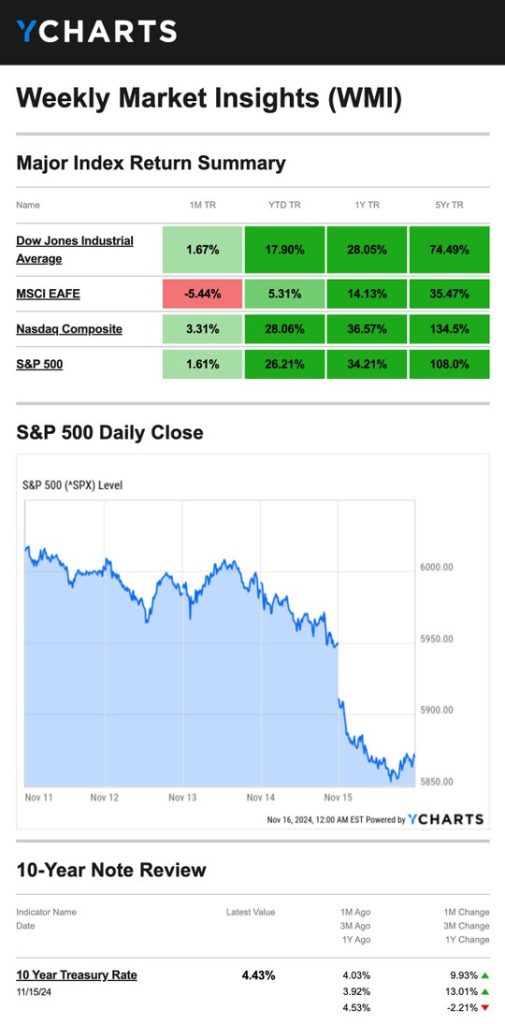By: Gerry Sparrow
Stocks fell last week as the postelection rally lost momentum amid an inflation uptick and cautious comments from Fed officials.
The Standard & Poor’s 500 Index fell 2.08 percent, while the Nasdaq Composite Index declined 3.15 percent. The Dow Jones Industrial Average lost 1.24 percent. The MSCI EAFE Index, which tracks developed overseas stock markets, dropped by 2.38 percent.1,2
Rally Fizzles, Data Rattles
Stocks began the week with modest gains as all three major indexes hit record highs. On Tuesday, stocks took a breather with monthly inflation pending.3
News that the Consumer Price Index (CPI) ticked up slightly in October injected some uncertainty into the markets. The Producer Price Index released the following day showed wholesale inflation ticked up last month. While both the CPI and PPI aligned with expectations, investors hoped for better news.
Comments from Fed Chair Powell that the Fed wasn’t “in a hurry” to cut rates were a bit unexpected, which put stocks under more pressure.4,5
Stocks dropped again on Friday as strong October retail sales seemed to reinforce Powell’s comments about Fed rate adjustments. News that Boston Fed President Susan Collins expressed doubts about what the Fed might do in December, putting further pressure on stocks.6

Tug-O-War
The inflation data that came in last week—retail and wholesale—show that the path to the Fed’s stated goal of 2 percent inflation may prove bumpy.
For the past couple of years, inflation has been the focus of the Fed’s efforts to manage rising prices by tightening the money supply. Ironically, strong retail sales numbers—while a sign of a strong economy—send a mixed message to investors. Confident consumers tend to spend money, which may take some pressure off the Fed as it looks to manage economic activity.
This Week: Key Economic Data
Monday: Fed Official Austan Goolsbee speaks. Housing Market Index.
Tuesday: Housing Starts and Permits.
Wednesday: Treasury Buyback Announcement.
Thursday: Existing Home Sales. Weekly Jobless Claims. Fed Official Beth Hammack speaks.
Friday: Consumer Sentiment.
Source: Investors Business Daily – Econoday economic calendar; November 15, 2024
The Econoday economic calendar lists upcoming U.S. economic data releases (including key economic indicators), Federal Reserve policy meetings, and speaking engagements of Federal Reserve officials. The content is developed from sources believed to be providing accurate information. The forecasts or forward-looking statements are based on assumptions and may not materialize. The forecasts also are subject to revision.
Originally posted on November 19, 2024
PHOTO CREDIT: https://www.shutterstock.com/g/Oranzy VIA SHUTTERSTOCK
FOOTNOTES:
1. The Wall Street Journal, November 15, 2024
2. Investing.com, November 15, 2024
3. CNBC.com, November 12, 2024
4. The Wall Street Journal, November 13, 2024
5. The Wall Street Journal, November 14, 2024
6. CNBC.com, November 15, 2024
DISCLOSURES:
Investing involves risks, and investment decisions should be based on your own goals, time horizon, and tolerance for risk. The return and principal value of investments will fluctuate as market conditions change. When sold, investments may be worth more or less than their original cost.
The forecasts or forward-looking statements are based on assumptions, may not materialize, and are subject to revision without notice.
The market indexes discussed are unmanaged, and generally, considered representative of their respective markets. Index performance is not indicative of the past performance of a particular investment. Indexes do not incur management fees, costs, and expenses. Individuals cannot directly invest in unmanaged indexes. Past performance does not guarantee future results.
The Dow Jones Industrial Average is an unmanaged index that is generally considered representative of large-capitalization companies on the U.S. stock market. Nasdaq Composite is an index of the common stocks and similar securities listed on the NASDAQ stock market and is considered a broad indicator of the performance of technology and growth companies. The MSCI EAFE Index was created by Morgan Stanley Capital International (MSCI) and serves as a benchmark of the performance of major international equity markets, as represented by 21 major MSCI indexes from Europe, Australia, and Southeast Asia. The S&P 500 Composite Index is an unmanaged group of securities that are considered to be representative of the stock market in general.
U.S. Treasury Notes are guaranteed by the federal government as to the timely payment of principal and interest. However, if you sell a Treasury Note prior to maturity, it may be worth more or less than the original price paid. Fixed income investments are subject to various risks including changes in interest rates, credit quality, inflation risk, market valuations, prepayments, corporate events, tax ramifications and other factors.
International investments carry additional risks, which include differences in financial reporting standards, currency exchange rates, political risks unique to a specific country, foreign taxes and regulations, and the potential for illiquid markets. These factors may result in greater share price volatility.
Please consult your financial professional for additional information.
This content is developed from sources believed to be providing accurate information. The information in this material is not intended as tax or legal advice. Please consult legal or tax professionals for specific information regarding your individual situation. This material was developed and produced by FMG Suite to provide information on a topic that may be of interest. FMG is not affiliated with the named representative, financial professional, Registered Investment Advisor, Broker-Dealer, nor state- or SEC-registered investment advisory firm. The opinions expressed and material provided are for general information, and they should not be considered a solicitation for the purchase or sale of any security.




